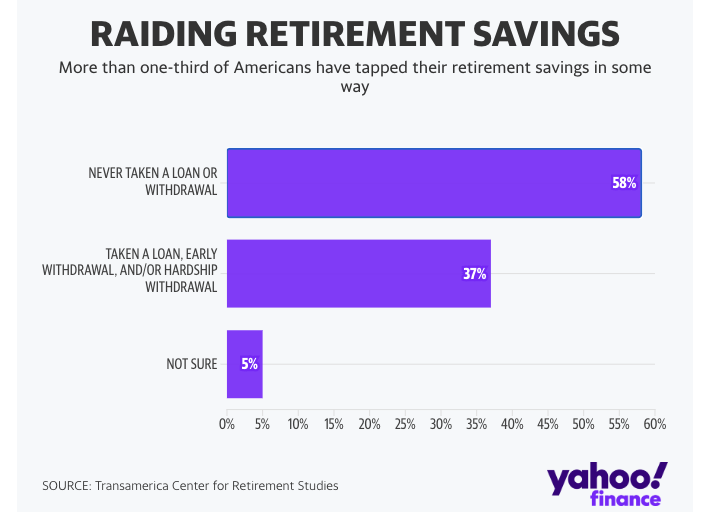Are You Raiding Your Retirement Nest Egg?
"The first half of life is devoted to forming a healthy ego, the second half is going inward and letting go of it."
– Carl Jung
Retirement pessimism may be growing because an increasing number of workers have taken a withdrawal or loans from their retirement plan. A recent survey by the Transamerica Center for Retirement Studies (TCRS) in collaboration with the Transamerica Institute reveals that over one-third of Americans have tapped into their retirement savings in some fashion. The survey polled 5,725 workers at a for-profit company between November and December 2022.
The reasons for early withdrawals are varied with 17% citing medical expenses, 16% seeking to avoid eviction, 15% paying expenses related to a disaster, 14% to pay tuition, and 13% to purchase a home.
Typically early withdrawals (typically before the age of 59 1/2) from qualified retirement plans are assessed a 10% tax penalty in addition to the funds being counted as taxable income (federal and/or state) which must be paid for that tax year. However, in the early days of the Covid-19 pandemic the federal government waived a number of penalties for early withdrawals from qualified retirement plans as part of the CARES Act (the Coronavirus Aid, Relief, and Economic Security Act). While this helped avert a financial disaster for many it also encouraged many to tap into funds that were otherwise earmarked for their non-working years.
Raiding Retirement Savings
Another means by which workers have tapped into their retirement nest egg early is through 401(k) loans. While plan sponsors are not required to offer loan provisions, many do. Typically a worker will have up to five years to repay the loan or up to 25 years if the funds are used to buy a principal residence.
Steve Parrish, adjunct professor and co-director of the Center for Retirement Income at the American College of Financial Services told Yahoo Finance, “With inflation, economic disruption, and the continuing wealth gap, some of the working population simply needs to access their money now. That includes tapping their retirement accounts.”
This trend is likely to accelerate should the economy worsen.
While early withdrawals will do little or nothing to boost immediate reverse mortgage demand, in the future it may make those nearing retirement or who have already retired reexamine tapping into a portion of their home’s value with a reverse mortgage.
The line between savings and retirement accounts has been blurred.




